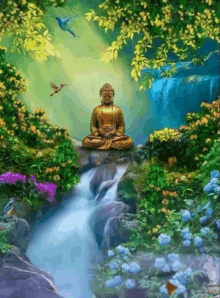Awakening for all: Zazen Benefit: Nirvana
Tomorrow will be the autumnal equinox, middle day of higan, yonder shore, meaning nirvana. For a thousand years in Japan, on this day and the three days before and after, Japanese people have practiced the six perfections and made offerings of ohagi, rice cake, etc., to the deceased, and shared them with neighbors.
Humans have the four inevitable sufferings of birth, aging, sickness, and death, and eight sufferings: the four just mentioned along with not getting the desired, parting from the beloved, meeting with the hated and, in short, our five aggregates, forms, feelings, formations, etc., being rampant.
The human species is said to be the supreme among living beings, but it has become the worst in causing climate change, ecological devastation, biodiversity destruction, and now even nuclear holocaust, advancing the Doomsday Clock to 90 seconds to doom.
This is due to human karma, especially the triple poisons of desire, divisiveness, and delusion, of its psycho-physical evolution and science-technological revolution. The Buddha attained nirvana and awakening and shared them for us all to attain them also.
Zazen stills our psycho-physical karma with its intellection, emotion, and volition, especially the two roots of craving and nescience, no witness of nirvana, no wind (of karma). It stills suffering and samsara, the struggling shifts through the six paths or realms.
September 21, 2024 C.E.
Note:
- The six perfections (pāramitā) are to perfect giving, morality, patience, striving, concentration, and prognosis.
- The five aggregates (pañca-skhandha:form, feeling, ideation, formation, and consciousness) are to further analyze the common two parts of body and mind to critically investigate the latter (feeling, ideation, formation: volition, etc., consciousness). These are all interdependently originating and ceasing (related and relative, thus not independent and eternal). The Buddha advised that we rely on ourselves and the Dharma, not others. This means that we must rely on ourselves, not others carelessly, but we must see and judge for ourselves whether things are true and just. He also advised that we not follow other a-Dharma (un-true, un-ethical, un-holy, un-effective, etc.) ways (cf. six other ways in his time: accidentalism, fatalism, skepticism, indeterminism, etc.).
- Karma is instilled with the triple poisons of desire, divisiveness, and delusion (of ego/mei: I/my). The Buddha said that all living beings are karma-birthed, -heirs, -owners, -machines, and -refuged. He clarified that there is no self-substance with self-sameness (permanent) and self-sovereignty (wishful) entities due to the Dharma (Truth/Law) of all dharmas (phenomena), Dependent Co-origination. We as karma-machines must change to the Dharma-refuged in order to change the world in suffering to one in holiness (wholly wholesome: harmonious, healthy, and happy).
- Nirvana means no wind (of karma imbued with the triple poisons of desire, divisiveness, and delusion), where one can for the first time witness the Dharma world and become awakened from the long night of nescience to the Dharma of all dharmas in calm, clear, controlled, and careful conditions, then prognosticate problems and sufferings in the Four Holy Truths and the Eight Holy Ways.
- Samsara (saṁ-sāra, total flow) means all/constant change of phenomena due to Dependent Co-origination, represented as “birth-death.” Usually we are going through the shift among the six (five) states/ways of human beings, animal beings, hungry ghosts, (fighting devils), hell beings, and celestial beings.
- The practice of Zen (jhāna/dhyāna: meditation), the key and core practice of za-zen, sitting meditation, is to still karma, settle in nirvana, see the Dharma, and serve and save all. This process is categorized in the Four Zen Stages and the Eight Concentration (samādhi) Stages (actually Four Zen Stages plus Four Concentration Stages combined, going together).
一切の為の覚醒:坐禅功徳:涅槃
明日は秋分の日、涅槃を意味する彼岸の中日である。日本で千年の間、この日とその前後三日、人々は六波羅蜜(完成)を行い、お萩を亡くなった人達に供えたり近所と分け合ったりしてきた。
人は生老病死の避けられない四苦と八苦をもっている、即ち先述の四苦に加えて求不得苦、愛別離苦、怨憎会苦、略して、身体、感受、行動など五蘊盛苦である。
人種は万物の霊長と言われているが、気候変動、生態劣化、生物多様性破壊、そして今では核ホロコーストで世界終末時計を終末まで90秒にまで進めている。
これは人間の業、特に心理‐身体の新化と科学‐技術の革命による貪瞋痴の三毒のせいである。ブッダは涅槃と覚醒を得て、一切の者も又それらを得ることが出来るようにそれらを共有した。
坐禅は知情意と共に心理‐身体業を静め、渇愛と、(業の)無風である涅槃を確証しないという、無明の二根を静め、苦と、六道即ち六界をもがき変転する、輪廻を静める。
2024共通年9月21日
註:
1.六波羅蜜(完成)は布施、戒律、忍耐、精進、禅定、智慧を完成させること。
2.(色:色形:身、受:感受、想:思想、行:行動、識:意識:心)の五蘊(集合体)は普通の身心二分法を更に分析し後者(受想行識)を批判的に検討する為のものである。これらは全て相互依存して生起、消滅する(相関相対だから独立でも恒常でもない)。仏陀は自らと法に依り、他に依るなと忠告した。これは、私達が自らに頼り、他に不注意に頼ってはならないと言う事であり、物事を真実で正義であるかを自ら見て判断しなければならないということである。彼は又他の不法(非真実、非倫理、非聖性、非効果など)に従わないよう忠告した(参考:同時代の六師外道:偶然論、運命論、懐疑論、非決定など)。
3.業は貪瞋(エゴ/メイ:我/我所の)痴の三毒が植え込まれている。ブッダ(覚者)は一切衆生は業—誕生者、—相続者、—所有者、—機械、—依拠者であると言った。彼は、諸法(現象)の法(真理/倫理)である縁起の故に自己同一(永住)と自己主宰(意欲通り)の実態をもった自己物質は存在しないことを明らかにした。業—機械である私達は、苦しむ世界を聖(全体健全:調和、健康、幸福)なる世界に変える為には、法₋依拠者にならなければならない。
4.涅槃は(貪瞋痴で染汚した業の)無風を意味するが、そこで人は静謐・明澄・統制・注意状態で法界を直証し諸法の法に初めて無明長夜から目覚めて、問題と苦に対する四聖諦、八聖道で般若(の知恵:処方)を得る。
5.輪廻 (saṁ-sāra, 字義は全‐流)は縁起の故に現象が全体/常時変化することで、生死(発生種滅)で代表される。通常人間、畜生、餓鬼、(修羅)、地獄、天上の五(六)状態/道を変化を経る。
6.禅(jhāna/dhyāna: 瞑想)、鍵となり核となる坐禅の実践、は業を静め、涅槃に安住し、法を見、一切に奉仕し救済する。この過程は四禅と八定(samādhi)である(実際には四禅と四定は一緒で結合している)。
.
.
.
.
.
.
.
.
.
.
Pictures above and the following were taken and sent
by Mr. Noriyuki Otsuka, Shimoda, Shizuoka, Japan
.
.
..
.
.
.
.
.
.
.
.
.
.
.
..
.
.
.
.
.
.
.







